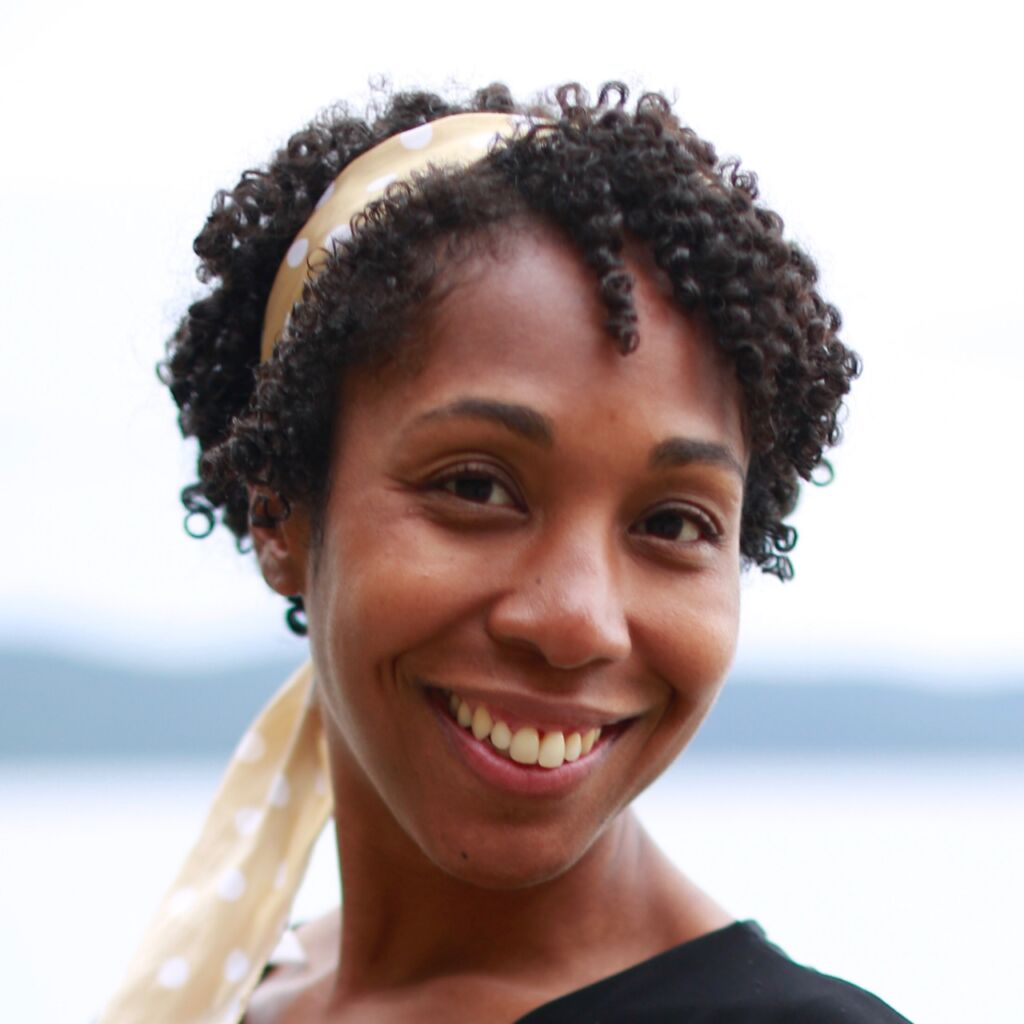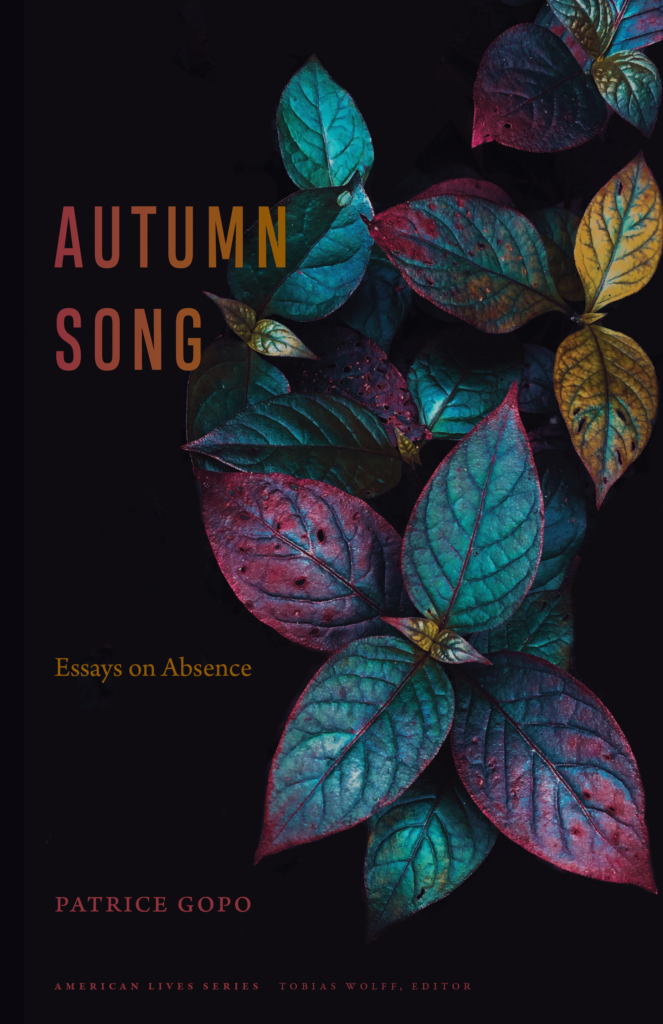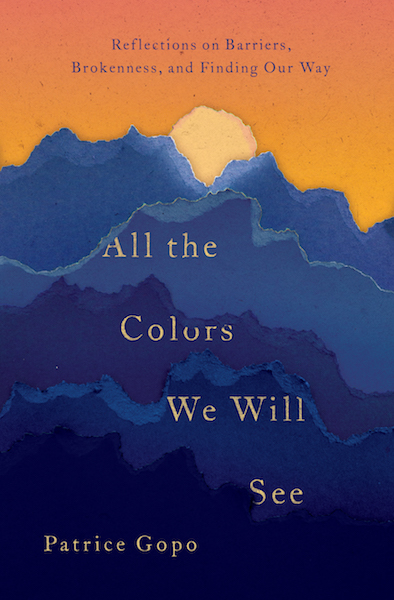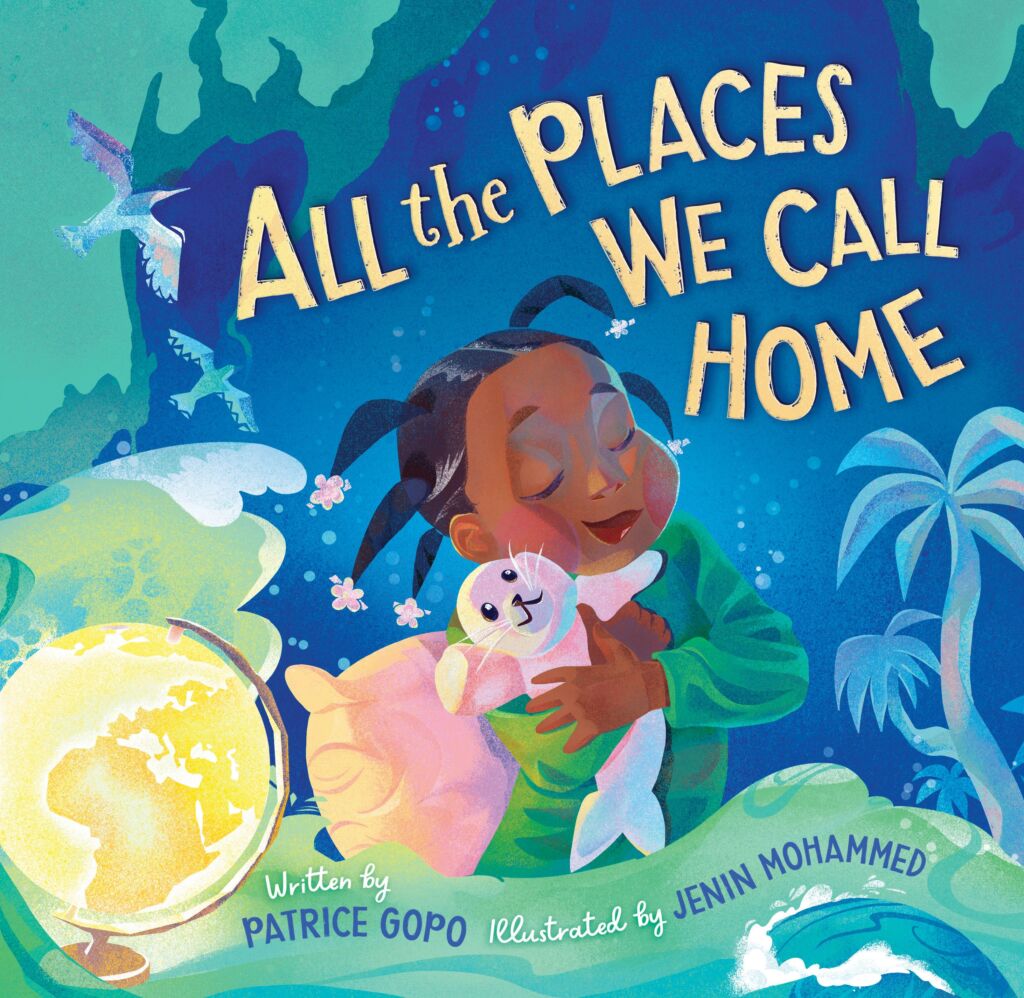Connection, Identity and Race: From MBA to Author
Tuesday, April 23, 2024
Student Opportunities
Patrice Gopo (left) and Minah Koela (right), who served as an interpreter in Cape Town for a WDI-funded project, with handbags made by local women business owners in South Africa.
A life-changing grant from WDI sent this student toward a new career, a family, and a renewed sense of global connection.
Patrice Gopo knows better than most how deeply we’re all connected. Growing up in Anchorage, Alaska, the child of Jamaican immigrants, she spent a lifetime navigating the tensions of that experience. She lived for years in the Alaskan cold, surrounded by people who could never quite understand what it meant to be different in the way she was. She vacationed in Jamaica, playing with family who would never manage the complex social dynamics she did. She belonged in both places — and in neither. On top of that, her life “didn’t always align with the typical experience that Black Americans are handed in the U.S.,” she explained. This multiplicity formed her foundation and brought unavoidable questions of belonging, place and home — ones she’s been grappling with all her life.
She’s carried these questions through her Master’s degrees in business and public policy from the University of Michigan, through a global internship and an MBA project supported by the William Davidson Institute at the University of Michigan (WDI), and into her current career as an author.
Gopo grew accustomed to feeling like she belonged nowhere and everywhere all at once. Eventually, instead of seeing division in the differences, she started to find connection. She sewed these complicated layers into the fabric of her life, personally and professionally. She built a career across borders, joining cultures and communities to form her foundation. She wove together a family whose arms reach around oceans. She spent years finding ways to bring people together, lending the skills she learned as a student at the University of Michigan’s Ross School of Business to South African business women and giving voice to the experiences of cross-culture children through her writing.
With her childhood as her guide, her education at U-M as a bedrock and her passion for service as her North Star, Gopo has grown into an accomplished author. Her books cover global communities, racial identity and compassionate growth — and a fortuitous internship supported by WDI helped get her there.
A Career Rooted in Connection and Identity
Becoming a writer wasn’t a path Patrice envisioned for herself at the start of her career. She focused her first collegiate experience in science and earned a Bachelor of Science in Chemical Engineering from Carnegie Mellon University. She spent a few years working as a development engineer at Eastman Kodak Company, working on some of the company’s technology products. Although she was in a creative occupation, Gopo (then Harduar) did not feel connected to the work.
She’d inherited a need to “add something beautiful to the world,” and she was still searching for her addition. Her father was a teacher and a principal; her mother was a school nurse. Both dedicated their lives to helping others thrive, and it was important to Gopo to find a path that did the same. “There was always this tug. How does this matter to others in the world?” she said. She didn’t feel it in the engineering world, though she sees how it’s possible now. “At the time, all I felt was this beating in my heart. I wanted to be doing more than just technical problem solving, and that’s what drew me to graduate school.”
She enrolled in the Master’s in Business Administration program at the University of Michigan’s Ross School of Business in 2004. While there, she added on a Master’s in Public Policy, set on using her degrees and skills to improve the lives of those struggling in low- and middle-income countries (LMICs). “I was intent on working in microfinance and micro-entrepreneurship,” she said. “I was interested in the ways we could use business to alleviate issues of material poverty in the world.”
She was determined to make a difference in a substantial, lasting and thoughtful way, and she understood that this change wouldn’t come out of solutions placed on communities by outsiders. “In the past, we’ve approached addressing some of these issues in ways that didn’t empower people to take over their own destiny,” she explained.
At the time, WDI was providing student grants to support socially focused business endeavors in LMICs. Gopo was searching for a way to contribute to self-determined development, and she discovered it in South Africa — and then applied for WDI funding.
While still completing her studies, Gopo took the initiative to propose a WDI-sponsored internship with the nonprofit organization ServLife in 2007. Her assignment explored what women-owned small businesses needed as they grew their enterprises. She was asked to share her newfound MBA skills to help the group improve gender equity and economic development in the region.
In what felt like a powerful vote of confidence to Gopo, the Institute approved her request. She flew to Cape Town after graduation to join the effort and spent eight weeks meeting with women to build out their business plans. Together, they considered revenue plans, laid out expenses and navigated the critical business-building requirements of entrepreneurship in LMICs. “I was part of something larger,” she said. “It was something that was already organically happening within this country and this community. I was invited to come and take these skills I had in running a small business and help empower these women.”

I think the people who show up in business school, particularly those doing projects with WDI, have a desire to make a difference in the world, and that desire is going to follow people. It doesn’t always mean you have to stay in one space doing the same thing.
– Patrice Gopo, author, Autumn Song
A Life-Changing Event
That moment, when Gopo was awarded funding from WDI, changed the trajectory of her entire life. It was more than a two-month internship. In South Africa, she saw what real impact efforts look like. She experienced, yet again, how deeply the world is intertwined. In a country far from where she was born, Gopo found a passion, a husband and, eventually, a career.
When she officially moved to South Africa to live with her husband, a Zimbabwean who was studying in the country at the time, she couldn’t work in business.
“I had all these skills. I had an MBA. I had a Master’s of Public Policy. What I didn’t have was a work permit. I wasn’t able to do any of the work I was trained to do at the time, and that’s when I started writing,” Gopo said.
It was a slow grind at first, finding spaces where she could lend her words. Eventually, she started to lean into the topics she knew best: identity, community and global connection.
Her first published work, All the Colors We Will See, dives into questions of intersecting heritages, race relations and complex identities through conversations about marriage, divorce, beauty and faith. Her second, Autumn Song: Essays on Absence, includes personal stories of loss, from dreams left to the wayside to older versions of ourselves who have disappeared. In it, she explores how she’s navigated grief, healing and change. Both compilations are deeply informed by her experience as a woman with intimate global ties.
Her children’s book, All the Places We Call Home, is a story about connection across borders, told through the universal topic of naps. It’s rooted in her own life — and now in the lives of her daughters. In it, a little girl is getting ready for bed with her mother and thinking about all the places around the world where she’s laid down her head to sleep. “I love this book because it’s telling a story that so many people have experienced, but it’s a story that has often been relegated to the margins,” Gopo said. “We don’t necessarily hear about families who have multiple ties to multiple parts of the world — or about the idea that home can feel fluid at times.”
Gopo’s writing is an exercise in togetherness, and it’s the next iteration of a long-held passion for uniting people toward a better future. In telling these stories, she says, “There’s power. There’s legacy. There’s identity. These things make us more confident and content in who we are and in our stories.”
The Breadth of a Business Education
Though her path may have diverted from those typically taken by business students, Gopo doesn’t believe there’s only one way to use the MBA degree. “I think the people who show up in business school, particularly those doing projects with WDI, have a desire to make a difference in the world, and that desire is going to follow people. It doesn’t always mean you have to stay in one space doing the same thing.”
Besides driving her toward her current career and family, Gopo’s time at the U-M taught her three important professional lessons. First, she now takes an active role in how her writing is released to the public. She identifies her target market, considers who would be interested in her stories and determines the value proposition of her work. On top of that, she carries the confidence she gained in Ann Arbor with her. At U-M, she was encouraged to try new things, test out solutions and adapt after lessons. She brings that surety into her writing career, pushing the bounds of her topics and how she reaches people. Finally, at Ross, there was constant encouragement to press on and improve issues of inequity and underdevelopment.
“That all still shows up in my writing because I’m the same person. I’m still a person who cares about what’s happening around me. I am this person who is asking questions and seeking answers, interested in issues of justice and how we think about that,” she said.
Gopo said her U-M and WDI experiences continue to crop up her professional life. The support she felt when she was provided that funding has given her the confidence to apply for more over the years. Gopo recently received a Cultural Vision Grant from the Arts and Science Council of Charlotte Mecklenburg County to implement a local public library program about sharing personal stories. “I created this program to draw people together through community, recognize the things we have in common and see the ways our journeys differ such that we can build greater understanding,” she said. “It may not necessarily be global, but it connects to my goal of empowering people to flourish in their lives.”
Gopo continues to explore the beauty of a multifaceted life through her writing, her podcast Picture Books Are for Grown-Ups Too! and her community work. Her books are available to purchase at Shelves, Main Street Books or Park Road Books.
Author headshot by Allie Marie Smith



